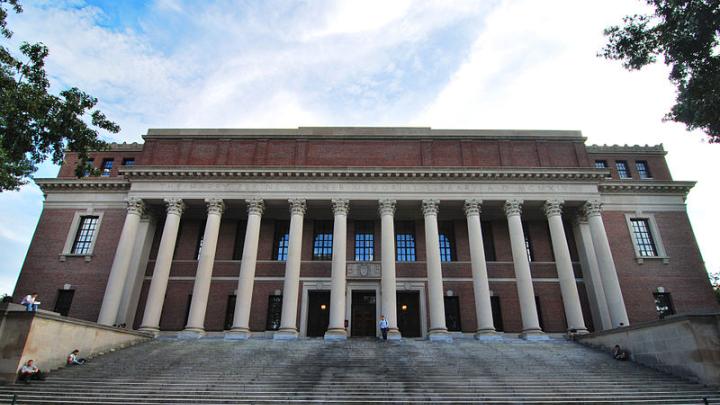The changing information landscape makes change at Harvard Library—the world's preeminent academic research library—inevitable. As part of the Harvard Library’s ongoing transition to a new organizational structure—in which many library services will be shared, and for which overarching information technology priorities have been identified—senior library administrators updated staff members on the process in three town-hall-style meetings on Thursday, January 19. (The Library has released an official transcript of the presentation.) In their comments, senior associate provost Mary Lee Kennedy and executive director for the library Helen Shenton announced that they would make specific restructuring recommendations to the library board on January 24. They explained that the changes would involve the elimination of some positions, significant changes to other positions, and the creation of new positions, and specified, in Shenton’s words, “A key change: the Library workforce will be smaller than it is now.”
News of the impending staffing cuts—including inaccurate reports that all staff had, in effect, been fired and would be required to reapply for their jobs—spread quickly through social-media sites and caused consternation among librarians at other research libraries. Stanford University’s assistant librarian, Chris Bourg, blogged that the general sentiment on Twitter was “that the town hall meetings produced more questions than answers” and that “rather than keeping staff informed, they served primarily to created [sic] significant anxiety.” More broadly, “Plenty of folks are worried that as Harvard goes, so go other academic libraries,” she wrote—“in other words, if massive layoffs can happen at Harvard (with its huge endowments), then no academic library is safe.”
Shenton and Kennedy also told library staff members that they hoped to be able to share more details of the restructuring at follow-up meetings in mid February. Their inability to provide more specifics during the question-and-answer periods that followed their presentations left many attendees frustrated. Inevitably, the process was compared unfavorably to a similar restructuring that took place at the Harvard Law School Library (HLSL) from 2008 to 2009, in which a steering committee made up of nine union and professional staff members led the change from within and worked to create as transparent a process as possible.
The University-wide restructuring, by contrast, is described by “many HLSL employees” (according to a Harvard Graduate School of Education case study of the HLSL restructuring) as “closed,” “dark,” and “bureaucratic”—perhaps inevitable for such a large-project: 73 separate libraries are involved. As one staffer who attended the January 19 presentation told Harvard Magazine, “One of the things that is different about the University-wide reorganization is that we are sorely lacking John [Palfrey]'s vision and communicable enthusiasm at this point.” Palfrey, Ess Librarian at HLSL, “did a lot of the heavy lifting in selling this process during the first half of the library transition, and since his announcement that he was leaving Harvard, I think our leadership has been floundering.…These changes need to be sold to us in order to work, and right now they are failing to sell them….”
At the meetings, staff members were encouraged to fill out employee profiles that will include job preferences, a description of skills, and a résumé. Employees also learned that the head of their local library unit would be able to tell them by mid February whether their jobs would be considered part of shared services—and therefore subject to centralized streamlining—or part of the local library, in which case staffing decisions would be up to the discretion of the dean of the school in which the library is embedded.
The new structure, with staffing changes in place, is expected to launch in July.








